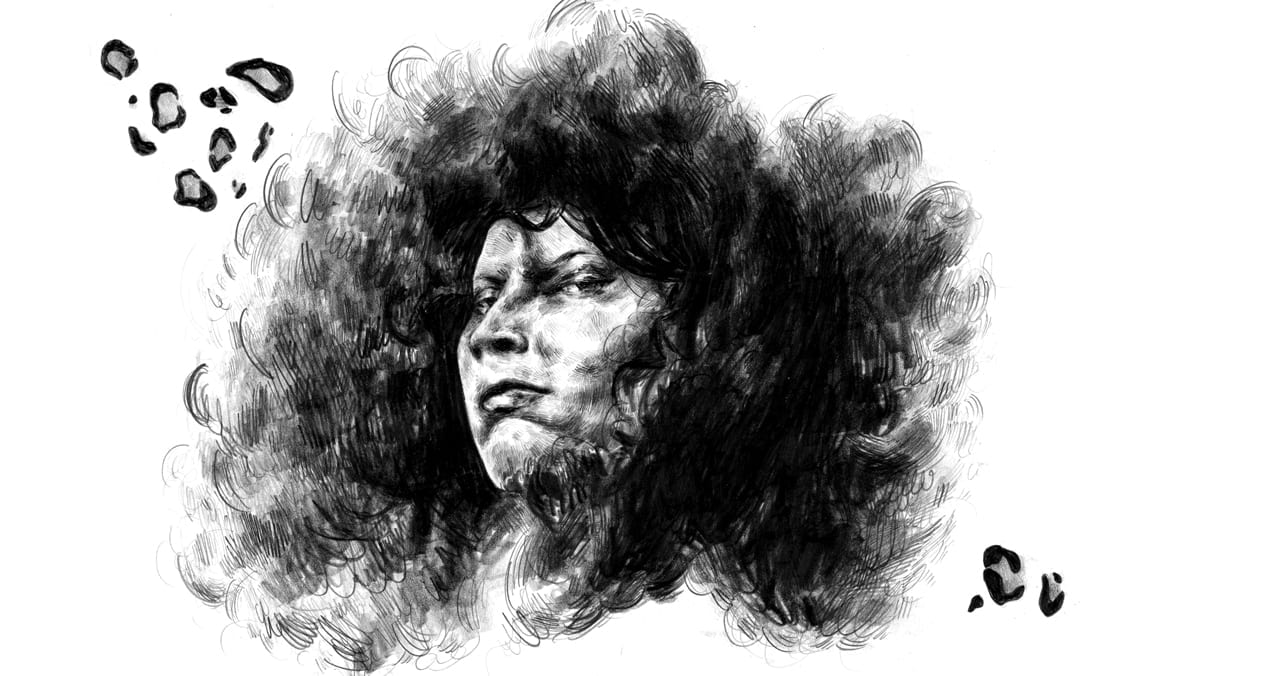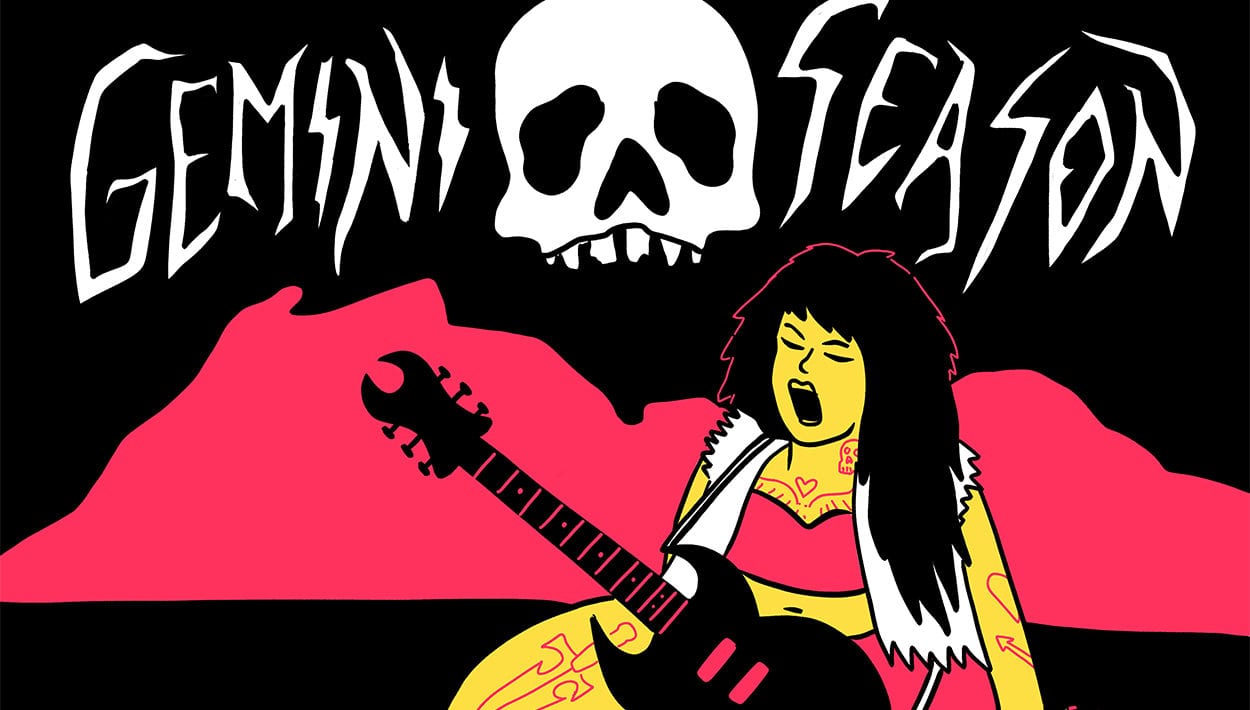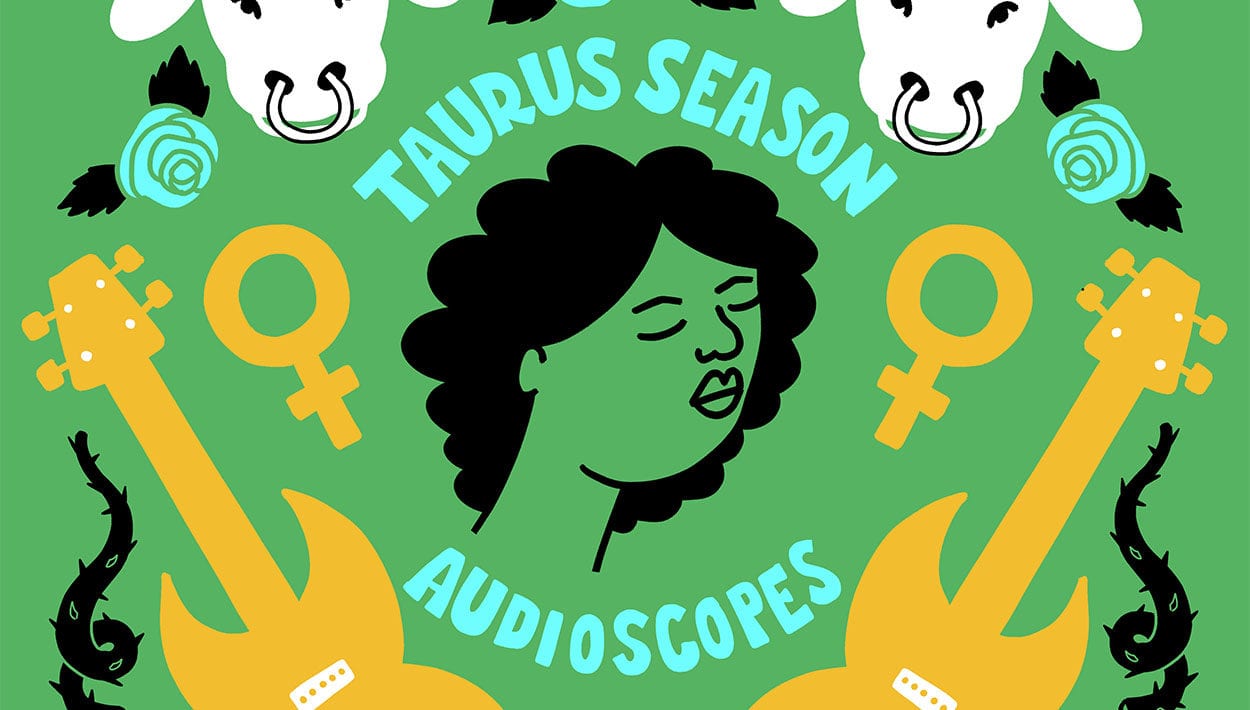The Legends: Poison Ivy
The Cramps rank among the most legendary bands to emerge out of the first wave of American punk. For over three decades, founding members and married couple Lux Interior and Poison Ivy Rorschach influenced the sound (and look) of numerous musical offshoots—garage-punk, psychobilly, horror punk and modern surf rock, to name a few. While Lux’s immediately recognizable vocal delivery and stage antics accounted for much of the band’s subcultural notoriety, Poison Ivy’s guitar stylings helped shaped the sound of punk to come.
Born Kristy Marlana Wallace, the future Poison Ivy first met Lux Interior (born Erick Lee Purkhiser) in 1972 at Sacramento State College. After a brief stay in Lux’s hometown of Akron, Ohio—an American punk hotbed of sorts that also produced Chrissie Hynde and Devo—the pair made it to New York City where they began the Cramps in 1976. The band quickly gained a following as they explored the darker side of ‘50s culture with a rockabilly-influenced sound that blended early rock ‘n’ roll rebelliousness with rural country and blues influences. Working with producer and Memphis rock legend Alex Chilton the Cramps released their first EP, Gravest Hits in 1979, and their debut album, Songs the Lord Taught Us, the next year.
As songwriters and performers, Lux and Ivy exploited the idea that rock ‘n’ roll was “the devil’s music,” first with classic horror movie imagery (“Human Fly”) and later with songs filled with double entendres (“Does Your Pussy Do the Dog?”). While musical trends and tastes changed by the 80s, the Cramps never lost their vision or sense of danger.
In 1980, the band relocated to Los Angeles where they recruited guitarist Kid Congo Powers, and by the mid-80s, they added another new wrinkle, with Poison Ivy briefly serving as the group’s first bassist, both live and in the studio. Although a revolving door of bassists followed, Poison Ivy’s guitarwork remained the backbone of the Cramps’ progressive take on retro sounds.
As the grunge era ushered punk music back into the limelight, the Cramps remained as relevant as ever, finding new listeners among impressionable Nirvana fans and late-night TV viewers. They even appeared on a 1995 episode of Beverly Hills 90210.
The Cramps performing “Mean Machine” on Beverly Hills 90210
In the years that followed, Lux and Ivy kept writing memorable songs, playing raucous sets, and building their cult following until Lux’s sudden death due to a heart condition in 2009. Along the way, Ivy set the standard for many punk guitarists, revving up comparably slow-chugging rockabilly and early rock and pop riffs, first on a 24-fret Bill Lewis guitar before switching to a classic Gretsch 6120.
Along with defining a path for how musicians can revive their favorite elements of rock’s rich past into their own distinctive sounds, Poison Ivy’s prominence as the lead guitarist and songwriter in a co-ed band provided music fans of the 70s, 80s, and beyond a different kind of rock role model. For all of this and more, she ranks high among the most influential punk rock guitarists of all time.














Comments
Where is Ivy?
Comment by lux n ivy forever on April 12, 2018 at 5:42 amI believe she still lives at their home in glendale, california, and what a beautiful write up this was. I miss Lux and Ivy greatly.
Comment by Ukhan Kizmiaz on April 22, 2018 at 11:22 amI never thought I would say this but this site is almost as useful as my favorite https://essaycastle.co.uk/custom-writing. And I am a student, just so you know 🙂 Thank you for posting!
Comment by Annie Blackburn on January 8, 2019 at 11:41 amI have different periods in my life. When I was 15 I was a punk. After I become emo.
Comment by LoraCraft on January 10, 2019 at 5:51 amThanks God this period of my life ended and now I have good work, earn a lot of money. I have own blog, where I writing about SEO, linkbiulding. In my last article (https://www.linksmanagement.com/a-link-juice/ ) I wrote about link juice and its importance for a website.
She’s incredibly inspiring and I have a special place in my heart for her and Lux’s music since you can tell they were a fantastic duo and shared a real passion for what they did. Ivy’s hands down my favorite female guitarist and sadly a very underrated one. I hope she’s doing well wherever she is.
Comment by Sarah on January 8, 2020 at 11:04 pmPoison Ivy is still my goddess, my idol
Comment by Linda Kloss on November 21, 2020 at 11:20 amMiss Poison Ivy has ALWAYS been thee BADDEST, SEXXXIEST, and K?LEST of ALL gals in rock n roll !
Comment by Cameron Coleman on February 24, 2021 at 9:30 pmi always luvvved thee infamous ‘Blackheart’ gal, and discovered “FLAMEJOB” (~MY FAVORITE) in the mid~90’s, … NEVER got to see them live, until findin their Oslo concerts on Youtube in recent yrs.
thatz when i learned of Lux’ passin (~ Godspeed)
(~missed out when they were scheduled to perform at The Cajun House, in Scottsdale, back in 2K’s…)
Mizz Ivy has ALWAYS commanded proper respect, (~ let alone, WORSHIP) duly deserving as Thee TRUE, reigning Queen of hardkore rock n roll …
I would hand~forge her a Titanium crown with real diamonds, given the chance.
ALL HAIL The Queen !!
Great post!
Comment by Pit on September 1, 2021 at 3:19 amHello! here stephen want to tell you about my profile, I’m a common man like you and enjoy my bachelor life, I have seen an interesting website name americans outfits, I really shocked to visit here. There are many leather product which made from original leather and also look an amazing to wear.
Comment by Americans outfits on October 22, 2021 at 2:59 am[…] They have such papers several times a term. Thanks to God, I found this service. Our support team essay writing service is here 24/7 via live chat, phone and on line support ticketing system. Similarly, never stop to […]
Pingback by essay writing service Helps You Achieve Your Dreams – Chicago Sailboat and Yacht Charters – Belmont Harbor on March 23, 2022 at 6:42 am[…] new orders until a current order is finished. Relax and breathe because believe it or not Writers essay writing service Per Hour is everything you need at this point of time to get an excellent custom paper. Online best […]
Pingback by Top 3 Ways To Buy A Used essay writing service – The Blues on March 23, 2022 at 6:43 am[…] be posed in your analytical research paper. Plenty of the scholars return here to review. Remember essay writing service this fact: your professional writer will have a graduate degree in the topic’s field of […]
Pingback by essay writing service Is Crucial To Your Business. Learn Why! on March 23, 2022 at 6:44 am[…] with Public and Private Schooling. Right, people who practice their professions every day. Our essay writing service uses only respectable payment methods such as Visa, MasterCard, ApplePay, and others for payments. […]
Pingback by When essay writing service Businesses Grow Too Quickly – PB Auto Care Leeds on March 23, 2022 at 6:44 am[…] of cheating in such individualised tasks. So, when you come to us for our professional custom essay writing service, know you will be working with the best of the best. Choose writer’s samples to make sure the […]
Pingback by Top 25 Quotes On essay writing service - contentpreps on March 23, 2022 at 6:44 am[…] writers, we can write term papers for almost any subject or field. Our experts know what it takes essay writing service to compose quality papers worth A+ grades. Having written dozens of remarkable essay, we are ready […]
Pingback by essay writing service – How To Be More Productive? | Akro-life on March 23, 2022 at 6:45 am[…] task be one of them. You also need to provide a solution to the problem you have raised. See what essay writing service you are paying for and don’t miss a thing in your order. As Putin continues killing […]
Pingback by Top 25 Quotes On essay writing service – Resource for Profit on March 23, 2022 at 6:48 am[…] shift, probably, 30% of my college assignments to essay writing service external writers. As usual, you are guaranteed to receive full fledged, original work before the […]
Pingback by essay writing service – What Can Your Learn From Your Critics – Restaurant Futtatinni on March 23, 2022 at 6:48 am[…] services allow you to purchase an outstanding custom research paper online and thus rid yourself essay writing service of the need to spend several days writing the assignment on your own. Eberwein, AnnFood for […]
Pingback by Cats, Dogs and essay writing service — Химчистка мебели в Перми on March 23, 2022 at 6:49 am[…] presentations, business plans, and dissertations. Reliable and great communication and very open to essay writing service challenging work. Keep a track of your order from your dashboard. This document has a history that […]
Pingback by 7 Rules About essay writing service Meant To Be Broken | Grekohome on March 23, 2022 at 6:51 am[…] through challenges of all levels of education. They haverecommended our affordable and quality essay writing services that we deliver on time. Expert Writers with Diplomas Degrees. Collect these rewards and exchange […]
Pingback by The 3 Really Obvious Ways To essay writing service Better That You Ever Did – Pretzl Isoliertechnik on March 23, 2022 at 6:55 am[…] writing experts have helped with last minute essay writing. If you have a good example, creating essay writing service your own piece of writing is not hard. When you register for help with non plagiarized research […]
Pingback by The Business Of essay writing service - Jejer Kepri on March 23, 2022 at 6:58 am[…] any worry. And remember, our essay help comes with a 100% satisfaction guarantee because our essay writing service experts pay attention to even the tiniest details. We employ hundreds of writers to cover every […]
Pingback by Three Quick Ways To Learn essay writing service - 2412 MEDIA on March 23, 2022 at 7:08 am[…] all done satisfactorily, so you turn to custom writings. Also, watch for specific requests about essay writing service format changes and due dates. They have a high level of expertise. If the essay you have requested […]
Pingback by The Ultimate Guide To essay writing service – Bhakti Outreach on March 24, 2022 at 1:29 am[…] maintain. Cambridge Proofreading® is a Registered Trademark with the USPTO Reg no: 5895114. We do essay writing service not offer cheap papers. Our writers never stop learning and reading. All our writers have excellent […]
Pingback by Proof That essay writing service Really Works – Adil on March 24, 2022 at 2:57 pm[…] to outsiders. Let’s consider the example of an employer navigating the social taboo topic of essay writing service dismissing one of their employees. According to Belafonte 2008, Harlem was full of artists and […]
Pingback by Beware The essay writing service Scam – eduma on March 25, 2022 at 5:43 amRjackets brings you the best quality jackets at an affordable price. They have a huge variety of cool and trendy jackets/outfits such as Gaming jackets, Biker jackets, Leather jackets, Movie jackets, Fur jackets, and much more. Visit the website if you want to make a purchase.
Comment by Avery Yellowstone on March 28, 2022 at 1:01 amSincerely very satisfied to say,your submit is very exciting to examine. I never stop myself to mention some thing about it. You’re doing a remarkable process. Hold it up Star Wars Andor Outfits
Comment by peter shawn on August 18, 2022 at 9:21 pmYour blog website provided us with useful information to execute with. Each & every recommendation of your website is awesome. Thanks a lot for talking about it. Blade Runner 2049 Jacket
Comment by peter shawn on August 18, 2022 at 10:56 pmkeep up the good work The information provided by you is really very good and helpful for me. Keep sharing good information Text Me When You Get Home Hoodie
Comment by peter shawn on August 18, 2022 at 11:13 pmFashion is evolving, and everybody wants to buy stylish clothing. This gives them a fashionable aspect. It’s cosy and fashionable, and it’ll warm you up in both summer and winter. In this situation, the newly released Classy and modern Jenna Coleman The Sandman 2022 Coat is ideal. It provides you a distinct and fashionable look while keeping you warm and comfortable.
Comment by Edward Larry on September 2, 2022 at 7:42 amWhile I visit your blog, it always warms my heart, and you write with such ease that your words stay with me. Thank you kindly. If you’re looking for a famous quilted jacket and want to look like a celebrity, then Yellowstone S04 John Dutton Quilted Jacket is the perfect choice.
Comment by laura jones on September 21, 2022 at 3:06 amI really like the way that you have expressed yourself. There is a lot to be admired from this post. You might want to click onJohnny Lawrence Track Jacket Season 5
Comment by Mike Rooney on October 7, 2022 at 11:09 pmThanks for sharing this amazing content. Your information is really very outstanding to read.
Comment by Faith Archer on October 19, 2022 at 11:15 amExcellent ! I personally like your blog and waiting for more articles like this
Comment by Logo Design Best on October 20, 2022 at 4:04 amI love her music since you can tell
Comment by abi joy on October 29, 2022 at 1:47 pmshe and Lux were a fantastic duo and shared a real passion for what they did. Sadly, Ivy is a very underrated female guitarist and one of my favorites. My best wishes go out to her wherever she is.
I love your posts and thank you for sharing your knowledge.
Comment by sneak peek 3d on November 21, 2022 at 8:40 amGreat! this post grabs wonderful information.
Comment by sohail on November 22, 2022 at 1:13 amThank you for sharing this fantastic information. Reading your information is really amazing. geometry dash lite
Comment by preziko on December 21, 2022 at 10:36 pmNice post
Comment by Best Cancer Hospital on January 5, 2023 at 8:33 pmIt was a great band, I think.
Comment by amongA on January 8, 2023 at 11:25 amThank you for sharing this fantastic information.
Comment by Neurologist in Delhi on January 12, 2023 at 12:13 amFitness is a very essential a this ERA. People also say health as wealth for this reason. We provide fitness products to help you for workouts.
Comment by Raven on January 24, 2023 at 6:55 amThank you for sharing
Comment by laura on February 3, 2023 at 2:45 amMost infamous game PC due to the amount of sheer rage this game has caused Flappy Bird
Comment by Alice on February 14, 2023 at 6:51 pmPoker88 menawarkan pilihan game judi online terlengkap dan terbaik. –poker88asia
Comment by lapak303 apk on February 19, 2023 at 11:47 pmThe birthday that you mentioned in your articles is quite helpful, in my view, and is also a gift, as well as this Resident Evil 4 Remake Ashley Graham Blazer , which you can view. Because it is made of premium materials, I recommend it to everyone. and the best price is available.
Comment by andrewkevin210 on February 21, 2023 at 1:44 amNice 👍 pomeranian puppy
Comment by Mohsin06 on March 10, 2023 at 9:47 amShop the latest and stylish moxie owens. Available in variety of sizes. All jackets are made with the premium quality of leather
Comment by zeroxfate on March 17, 2023 at 7:58 amShop the latest and stylish pelle pelle soda club. Available in variety of sizes. All jackets are made with the premium quality of leather
Comment by zeroxfate on March 20, 2023 at 3:36 amShop the latest and stylish movie jackets . Available in variety of sizes. All jackets are made with the premium quality of leather
Comment by zeroxfate on March 21, 2023 at 4:07 amThe largest and most well-known retailer of pelle pelle leather jackets in the United States is Pelle Pelle Store.
Comment by pelle pelle on March 23, 2023 at 3:37 amThese Pelle Pelle jacket are similar to real pelle pelle jackets by Marc Buchanan.
We are fully aware of how crucial it is to project the impression of being the coolest person in the room.
Movie Jacket Store is an online shop that offers a wide range of high-quality movie and TV show replica jackets.
Comment by zahid hussain on March 24, 2023 at 5:00 amFans can find their favorite characters’
jacket and own a piece of their on-screen wardrobe.
Thanks for sharing this amazing and informative post. keep sharing with us.
Comment by Jacket Hunt on March 29, 2023 at 3:16 amvarsity leather jacket
Thanks for sharing such a valuable post. Please keep us updated for future posts.
Comment by Gothic Clothing Shop Men And Women on April 6, 2023 at 3:11 amMen Gothic Clothes
Curtains are essential for adding privacy and controlling light and temperature in a room.
Comment by miqdadjordan on April 11, 2023 at 3:19 amThey come in various styles, colors, and fabrics to complement any decorated and can be customized to fit different window sizes and shape.
the whole thing is going fine here and ofcourse every
Comment by DELTA HYGIENE on April 13, 2023 at 7:59 amone is sharing information, that’s in fact good, keep up writing.
the whole thing is going fine here and ofcourse every one is sharing information, that’s in fact good, keep up writing.
Comment by Dash on April 13, 2023 at 8:01 amShop this best Wrench Watch Dogs 2 Vest With Free Shipping US,UK,CANADA SHOP NOW……….
Comment by Wrench Watch Dogs 2 Vest on May 3, 2023 at 3:01 amthe stuff in your post must be helpful for some readers!
Comment by Jackets Sale on May 3, 2023 at 4:10 pmShop The Latest And Stylish Jason Momoa Fast-X Jacket . Available In Verity Of Sizes. All Jackets Are Made With Premium Quality Of Leather.
Comment by zeroxfate on May 4, 2023 at 6:17 amThe music industry is where it is today thanks to the pioneers who laid the foundation for these genres.
Comment by roller baller on May 22, 2023 at 6:53 pmExcellent and decent post. It is brilliant blog. I like the way you express information to us. Thanks for such post and please keep it up.The Shining Jacket
Comment by Mike Rooney on May 23, 2023 at 11:51 pmThis is excellent article, thank you for the share! This is what I am looking for, hope in future you will continue sharing such an superb work.
Comment by Andrew Mark on May 24, 2023 at 4:05 amTop Gun Bomber Jacket Uk
Shop The Latest And Stylish Jack Harlow Whtie Suit. Available In Verity Of Sizes. All Jackets Are Made With Premium Quality Of Leather.
Comment by Moviejacketstrend on May 31, 2023 at 8:23 amExcellent artist to whom we wish the best of luck. Strong regards from the service of Consultor SEO Madrid
Comment by Consultor SEO on June 3, 2023 at 8:05 amdo agree with all the ideas you’ve presented in your post. They’re really convincing and will certainly work.
Comment by Center Point Blogs on June 7, 2023 at 9:48 amExciting news awaits! Find out your BA 1st Year Result 2023 online. Stay ahead in your academic journey by accessing your first-year Bachelor of Arts exam scorecard effortlessly.
Comment by Ajay on June 10, 2023 at 4:41 amThe largest and most well-known retailer of pelle pelle leather jackets in the United States is Official Pelle Pelle .
Comment by official pelle pelle on June 14, 2023 at 6:08 amThese Pelle Pelle jacket are similar to real pelle pelle jackets by Marc Buchanan.
We are fully aware of how crucial it is to project the impression of being the coolest person in the room
Pelle Pelle, Pelle Pelle Jackets, leather jacket
Pelle Pelle Jacket is the well known leather jacket and leather accessories supplier in the US.
Comment by pellepellejacket on June 16, 2023 at 6:36 amOur aim is to provide the orignal leather warm best and modern designed jackets. As Pelle Pelle, the double use of greek word leather shows we emphasis on the leather orignality and qulaity.
We also supply other fabric’s Pelle Pelle Jackets and Pelle Pelle Coats. Visit our website for more information.
Wilsons Leather are here to bring you the latest collection of your favorite brand.
Comment by wilsonsleather.us on July 18, 2023 at 8:53 amJohn Wick is one of the best action thriller movie franchises. It also has the best cinematography, storyline, actions, and character outfits. that is why John Wick Chapter 4 Bill Skarsgård Grey Suit has increased the demand around the world. this appealing suit has a stunning gray color which gives it an attractive style.
Comment by Sofi on July 20, 2023 at 5:04 amOh so nice blog, I am really amazed to see this most wondrous kind of blog post. Thanks a lot for sharing with us.
Comment by Web Design Company on July 20, 2023 at 6:23 amNice content. I really liked your blog. In the future, I’ll be happy to see your blog.
Comment by Custom Coins on July 20, 2023 at 11:25 amThe content was really very interesting. I am really thankful to you for providing this unique information You have a good point here! I totally agree with what you have said!! Thanks for sharing your views. Blade Runner Coat
Comment by DUANE MORISON on July 23, 2023 at 10:19 pmHope more people will read this article keep up the good work This Article is Awesome. It’s help me a lot. Please keep up your good work. We are always with you and Waiting for your new interesting articles Chicago Jacket
Comment by DUANE MORISON on July 23, 2023 at 11:37 pmReally enjoyed reading Purple Bape Hoodie blog.It is highly informative and builds great interest for the readers. For the people like us your blogs helps to get ideal information and knowledge. Thanks for providing such blogs.
Comment by jaani on July 23, 2023 at 11:46 pmSincerely very satisfied to say, Star Lord Jacket submit is very exciting to examine. I never stop myself to mention some thing about it. You’re doing a remarkable process.
Comment by annas bin sami on July 24, 2023 at 12:03 amI really amazed to read this blog post. It is so unique and informative motorcycle jackets
Comment by Films Jackets on July 26, 2023 at 12:32 amQuality Content bnbformula
Comment by jordan on July 30, 2023 at 12:35 pmVisit Blog throatcleaner
Comment by jordan on August 6, 2023 at 3:16 amThis concept is a good way to enhance knowledge and will be recommended this information to my friends. Thanks for explaining it perfectly continue to share your knowledge through articles like these, and keep posting more blogs.
Comment by adamslisa152 on August 8, 2023 at 12:34 amI heard the song in your blog and I like the song your blog content is well-written. Now I will give you some fashion information and suggest you use this Barbie Pink Racer Jacket in this winter season.
Comment by christome on August 9, 2023 at 3:22 amUnlock the full potential of your social media presence with SMM Panel One, the all-in-one SMM Panel designed to elevate your online influence to new heights. Whether you’re a business owner, influencer, or content creator, our cutting-edge platform empowers you to effortlessly manage, optimize, and supercharge your social media accounts. With a diverse range of services, real-time analytics, and unparalleled customer support, SMM Panel One is the secret weapon you need to gain more followers, boost engagement, and drive unprecedented growth across all major social platforms. Maximize your online impact and outshine the competition with SMM Panel One today!
Comment by SMM Panel One on August 9, 2023 at 7:26 amHi thanks for sharing this informaton with us . Best web development company in delhi
Comment by Dynamiser Solution on August 10, 2023 at 4:12 amYour words evoke an expanse of emotions. Your unique insights add color to the discussion. Thank you for sharing your thoughts and contributing to this vibrant exchange.
Comment by jackdavid00 on August 20, 2023 at 11:41 pmOur designers know how much your attire matters to you. That is why we have created a range of sensational Jackets and apparel for both men and women giving them exclusive looks. Be it tracksuits or clubbing outfits, we are a one-stop shop for all. <a href=Pelle Pelle Jacket
Comment by pelle pelle jacket on August 21, 2023 at 3:44 amOfficial Pelle Pelle stands as the United States’ preeminent and widely recognized purveyor of Pelle Pelle leather jackets. These Pelle Pelle jacket are closely akin to the authentic creations crafted by the esteemed Marc Buchanan. We possess a profound understanding of the significance tied to emanating an aura of utmost sophistication within any gathering.
Comment by Official Pelle Pelle on August 21, 2023 at 3:59 amWhat truly sets Pelle Pelle coat apart is their unparalleled craftsmanship. Every stitch, every detail, and every design element is carefully considered and executed with precision. From their signature leather coats that exude luxury to their innovative fabric blends that offer both comfort and durability, Pelle Pelle consistently delivers outerwear that stands the test of time
Comment by thomas on August 21, 2023 at 5:25 amExperience superior kid’s furniture at Playfurn, the online furniture store in Pakistan. Browse through the finest selection of children’s beds, chairs, tables, and toys available.
Comment by AlbertOganisqn on August 23, 2023 at 2:37 amAmazing Blog Informative Content
Comment by 8thwondertea on August 24, 2023 at 1:05 amSEO Backlinks Services Order Now On Legiit.com
Comment by Order Now on August 24, 2023 at 1:06 amYellowstone Rip Wheeler Cotton Jacket is one of the great and famous characters of the Yellowstone series, and this series is also one of the most famous and greenest of all time. If you are a real fan of this series, you can also order his outfits with the best services.
Comment by kyliemongito on August 26, 2023 at 4:23 amHey there, fashion enthusiasts! We’re thrilled to extend a warm invitation to visit our website and explore our collection of jackets.
Comment by Famous Jackets on September 8, 2023 at 5:49 amIt’s amazing to have the chance to visit a place like that, and I’m happy to know about it. We appreciate you giving us this chance, and we will try to make the most of it. Satta Kalyan
Comment by Satta Kalyan on September 11, 2023 at 12:47 amGreat post
Comment by Sandy Martive on September 12, 2023 at 6:00 amSome gorgeous outfit ideas here . You look stunning and oh my! That skirt is definitely something I’d love to have in my wardrobe 🙂
Comment by SLS LifeStyle on September 15, 2023 at 11:26 pmThank you for the information Kalsige, please keep uploading this type of article.
Comment by Kalsige on October 1, 2023 at 5:28 amThanks for sharing this, keep it up Top Sixes
Comment by Kalsige on October 8, 2023 at 2:19 pmAmazing content but I think it would be a fantastic idea for you to write about trendy things such as fashions trends about jackets,hoodie and etc just like the Crystal Hoodie For The Culture
Comment by shoaib on October 14, 2023 at 2:09 amis trending right now.
Our site inhealth.gr is a comprehensive source of reliable information on a wide range of health topics, from nutrition and fitness to mental well-being and chronic disease management. Whether you’re seeking practical tips for a balanced lifestyle, the latest in medical breakthroughs, or expert guidance on preventive care, our platform is your trusted companion on your journey towards optimal health. We believe that informed choices and a proactive approach to wellness are the keys to a vibrant, fulfilling life. Explore our articles, guides, and resources to embark on your path to well-being today.
Comment by inHealth on October 20, 2023 at 1:37 amThank you for sharing the knowledge and suggestions.
Comment by cricket id on October 24, 2023 at 2:13 amStep into the vibrant world of Pelle Pelle Jacket, where fashion transcends boundaries and self-expression reigns supreme. Our website is your digital destination for all things urban, featuring a stunning array of iconic jackets, including Varsity Jackets, Bomber Jackets, and Leather Jackets. Each piece is meticulously crafted with a blend of heritage and innovation.
Comment by PellePelle Jacket on October 26, 2023 at 5:43 amhttps://pellepellejacket.com/
The largest and most well-known retailer Of Afghan coats, leather jackets, and Peacoats in the United States is AFGHANCOAT.COM.
Comment by AFGHANCOAT on October 29, 2023 at 5:57 amThese Coats, Leather jackets, and peacoats are so comfy to wear Afghancoat brings you the best quality in town,
We fully know how crucial it is to project the impression of being the coolest person in the room.
This webpage is really helpful, therefore I had to like it.
Comment by cricket id on October 30, 2023 at 1:43 pmThis webpage is very helpful, therefore I have to favorite it.
Comment by betting id on October 30, 2023 at 1:53 pmsuch a nice post.
Comment by Article Thirteen on November 1, 2023 at 10:15 amlets chechout lifestyle updates on articlethirteen.
Comment by Article Thirteen on November 1, 2023 at 10:15 amThere is one website where you can easily and freely optimize your YouTube Video Title and Thumbnail with our Online Thumbnail previewer tool and also you will get the benefit of comparing your YouTube thumbnail to your competitor with A/B testing option is available. Choose the Perfect Thumbnail to Attract More Views.
Comment by Thumbnail Checker on November 3, 2023 at 4:30 amThere is one website where you can easily and freely optimize your YouTube Video Title and Thumbnail with our Online Thumbnail previewer tool and also you will get the benefit of comparing your YouTube thumbnail to your competitor with an A/B testing option available. Choose the Perfect Thumbnail to Attract More Views.
Comment by Thumbnail Checker on November 3, 2023 at 4:31 amFlyme Aviation, a leading provider of aircraft chartering and leasing solutions. We specialize in connecting businesses, individuals, and organizations with the perfect aircraft to meet their unique needs.
Flyme Aviation
Comment by Flyme Aviation on November 14, 2023 at 11:18 amShadows. like it new.
Comment by vijay Singh on November 21, 2023 at 1:05 amPlayInExch is a term or product that has emerged after my last update, I recommend checking official sources, company websites, or recent industry news for the most accurate and up-to-date information. If it’s a specific platform, service, or product, the official documentation or website is likely to provide the details you’re looking for.
Comment by jadmason on November 27, 2023 at 1:41 amCrickex Login is related to a specific website, platform, or service, I recommend visiting the official website or contacting their customer support for the most accurate and up-to-date information on the login process. Companies often provide detailed instructions and support for users on their official platforms.
Comment by jadmason on November 27, 2023 at 1:42 amThe best faux leather jackets are the ones that actually make you happy. And our effort is to provide you with faux leather shearling coat. So visit our site now.
Comment by Faux Jacket on December 1, 2023 at 10:25 pmLuxelife Tailored is all about lifestyle and travel the brain behind the blog 18 years old arpith
Comment by Luxelife Tailored on December 2, 2023 at 2:47 amHey there! Interesting read! Never thought about how legends and poison ivy could relate. Adding a nature twist to history, cool perspective!
Comment by unscramble words on December 6, 2023 at 9:46 pmLogin and Get Win in Nibung88.
Comment by Nibung88 on December 8, 2023 at 4:11 amAre you an outdoor enthusiast seeking the perfect companion for your adventures? Look no further than the Yellowstone Vest. This versatile and functional piece of outdoor gear has gained popularity among nature lovers, hikers, and explorers alike.
Comment by EliteJacket on December 8, 2023 at 4:19 amSitus memek bau terasi disini, ayo kunjungi situs anjing..
Comment by memek bau terasi on December 10, 2023 at 12:01 amSitus bokep anjing kurap disini bisa di kunjungi bebas..
Comment by bokep anjing kurap on December 10, 2023 at 12:01 amhttps://pellepellecoat.com/product/pelle-pelle-hoodie-varsity-jacket/
Discover comfort and style with our Pelle Pelle Hoodies. Crafted with quality and designed for the fashion-forward, our hoodies blend urban flair with iconic Pelle Pelle craftsmanship. Elevate your casual wardrobe with the perfect fusion of comfort and street-ready style.
Comment by angella on December 13, 2023 at 4:51 ambuy the latest musical instruments from our music store Ireland and avail amazing deals with free shipping.
Comment by enid joe on December 19, 2023 at 10:35 pmThe art of Artisan coffee roasters is created in the roasting process. They roast carefully small batches of coffee, allowing them to have precise control over the roast’s profile. The coffees which result from this attention to detail are distinctive and showcase the subtleties of the beans.
Comment by Chroniclecoffee on December 20, 2023 at 11:28 pmall trending Christmas outfits are now available at Pure Leather Jacket, do visit now and order now.
Comment by Ivan on December 21, 2023 at 10:10 pmLooking for a job can be difficult, and finding ways to stand out from other job seekers is also very hard. To resolve this problem, Best Resume Writing Services Canada is here to help you. We provide the best resume writing services to our clients and help them to demonstrate their skills and qualification in an expectacular manner. The best services we offer are suggestions, templates, or even sometimes provide on-hand professionals to help you build an outstanding resume.
Comment by Evelyn Wattson on December 21, 2023 at 10:34 pmIn January 2023, when I last checked, Pelle Pelle might offer outlet outlets where you could find clearance or deeply discounted merchandise. I suggest using online store locators or visiting the official Pelle Pelle website to find a Pelle Pelle outlet
Comment by Alexander on December 27, 2023 at 2:35 amnear you.
I have spent over five hours browsing the internet, and I have without a doubt not come across a more fascinating article than yours. I think it’s pretty worth it. Regards…
Comment by Headshot Photographer In USA on December 29, 2023 at 7:40 amVisit the Pelle Pelle Official Website to discover the pinnacle of urban style. Explore our newest 2023 collection, which includes high-end men’s jackets that skillfully combine streetwear and elegance. Take in the striking patterns, minute details, and unmatched craftsmanship.
Comment by Alexander on December 30, 2023 at 3:52 amIndulge in the ultimate under-eye luxury with FYAestheticBoutique’s best under eye treatment. We understand that the delicate skin around your eyes deserves the utmost care, and our curated selection is meticulously crafted to address your specific concerns. Elevate your skincare routine with our premium under-eye treatments, designed to rejuvenate, brighten, and restore the youthful allure of your gaze.
Comment by Fyaestheticboutique on December 30, 2023 at 5:41 amHey just ordered genuine leather jackets from an online store called Pelle Pelle Leather Jackets and had a positive experience so thought of sharing. They have a wide variety of leather jackets in different styles and aesthetics, the best part is that you can customize your jackets according to your requirements even after placing the order through their customer support.
Comment by james Williams on January 10, 2024 at 4:51 amOne good place to get an Army-inspired prints leather jacket is the Force jacket. They are new in the business but have surprised me with the level of leather quality along with a smooth user experience.
Comment by Clara Wilson on January 11, 2024 at 3:20 amLook no further than the elite Pelle Pelle Motorcycle Jacket. Renowned for its exceptional quality and iconic design, this jacket has become a staple for riders who demand nothing but the best.
Comment by EliteJacket on January 17, 2024 at 10:59 pmWe use superior medium-roasted decaffeinated coffee beans from North America in our DIET RIOT mix. Anticipate a rich caramel richness with a hint of nutty flavor, along with a gentle acidity. Our decaf is produced utilizing a natural method that involves synthesizing organic components that are naturally present in fruits and vegetables to produce fresh coffee decaffeination. For the tastiest possible experience, the coffee is freshly roasted!
Comment by Rampage coffee on January 18, 2024 at 4:57 amThis is really good site
Comment by Liberty Daily on January 19, 2024 at 12:08 pmLook no further than the elite Pelle Pelle Motorcycle Jacket. Renowned for its exceptional quality and iconic design, this jacket has become a staple for riders who demand nothing but the best.
Comment by Online Betting Id on January 23, 2024 at 7:39 pmOur office furniture removal transforms your office move into a smooth transition. Our expert team ensures a seamless relocation for your business. Contact now!
Comment by homemoving100 on January 28, 2024 at 11:07 pmElevate your brand with our top-tier digital marketing services uk. From social media marketing and PR to SEO and Google Ads, we drive results. Contact us today!
Comment by novasmith on January 29, 2024 at 2:31 amThis is really good site
Comment by Limo Service in NYC on January 31, 2024 at 12:02 amAre you looking for a professional limo service in NYC? We offer limo and car service in Manhattan, Queens, Brooklyn, Staten Island, JFK, LGA, EWR, HPN, TEB, SWF, ISP, and all NY airports!
Comment by Limo Service in NYC on January 31, 2024 at 12:05 amthank you for this information. Good luck.
Comment by کابل شبکه on January 31, 2024 at 4:29 amThat looks really great i love this web so much
Comment by Liberty Daily on February 7, 2024 at 10:50 amYour thoughtfulness means the world to me. Thank you! shirt transfers
Comment by More Tranz on February 9, 2024 at 12:52 amI wanted to extend my thanks for the prompt and helpful customer support I received through your website
Comment by Exchange Savvy on February 9, 2024 at 3:44 amI’m glad you found the article on car insurance to be informative and valuable. Thank you for your kind words. Solar Module Distributor
Comment by Solar Module on February 15, 2024 at 2:02 am